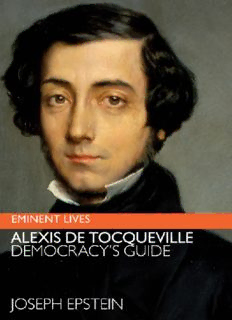
Alexis De Tocqueville PDF
Preview Alexis De Tocqueville
A l e x i s d e T o c q u e v i l l e Democracy’s Guide Joseph Epstein e m i n e n t l i v e s For Maurice Rosenfi eld (1914–2005) Intelligence is the power of seeing things in the past, present, and future as they have been, are, and will be. —George Santayana Letter to Horace Meyer Kallen, March 15, 1917 Contents Epigraph iii Introduction What would Count Alexis de Tocqueville (1805–1859), were he alive… 1 Chapter One Alexis-Charles-Henri Clérel de Tocqueville was born in Paris on… 9 Chapter Two Tradition would have had Alexis de Tocqueville, as an aristocrat,… 21 Chapter Three Tocqueville and Beaumont left for North America on April 2,… 29 Chapter Four Toward the end of his visit to America, Alexis de… 47 Chapter Five The book, published in January 1835, was a smashing success,… 63 Chapter Six In the introduction to Democracy in America, Tocqueville provided a little… 83 Chapter Seven Even before the reviews were in on his second volume,… 109 Chapter Eight Tocqueville won his first official claim to powers of prophecy… 125 Chapter Nine Tocqueville spoke of his pleasure in being free of the… 143 Chapter Ten In 1850, because of a serious breakdown in his health—… 161 Chapter Eleven On an August afternoon in Cherbourg in 1850, out for… 183 Epilogue In his three books, several notebooks, and hundreds of letters,… 199 Acknowledgments About the Author Other Books by Joseph Epstein Other Books in the Eminent Lives Series Credits Cover Copyright About the Publisher Eminent Lives—brief biographies by distinguished authors on canonical figures—joins a long tradition in this lively form, from Plutarch’s Lives to Vasari’s Lives of the Painters, Dr. John- son’s Lives of the Poets to Lytton Strachey’s Eminent Victorians. Pairing great subjects with writers known for their strong sen- sibilities and sharp, lively points of view, the Eminent Lives are ideal introductions designed to appeal to the general reader, the student, and the scholar. “To preserve a becoming brevity which excludes everything that is redundant and nothing that is significant,” wrote Strachey: “That, surely, is the fi rst duty of the biographer.”
Description: